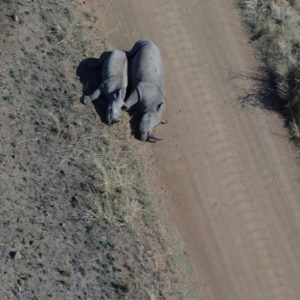Traditional leaders: Govt not doing enough to fight rhino poaching
The tribe leaders say they are afraid that the animals may become distinct which they say could eventually lead to a decrease in their area.
Pelane Phakgadi | 36 minutes ago
JOHANNESBURG - Traditional leaders around the Kruger National Park in Limpopo and Mpumalanga say that government’s fight against rhino poaching is not enough.
The tribe leaders say they are afraid that the animals may become extinct, which they say could eventually lead to a decrease in their area.
This is after the tribal leaders, together with the park’s officials and police, visited a crime site at the park, whereby a rhino was killed and dehorned.
Kgoši Mathibela Mokoena of the Mokoena Tribal Council has urged authorities to include intelligence services in their operations, and find out who the horns are sold to and for what reason.
He says if the market is identified, it could be easier for the park and police to fight the scourge.
Mokoena has also called on communities to form part of committees which seek to discourage people from poaching.
“If our intelligence services are powerful and strong, they’ll be able to identify some of these elements which are unwanted in our areas,” he said.
Mokoena says park officials should also be vetted.
The chiefs made an announcement through Mokoena, saying it would be important to have a joint meeting with all stakeholders, including police, national and private parks and communities in an effort to increase tourism in the area.
The Kruger National Park’s Managing Executive Glenn Phillips responded that the park has a yearly ranger budget of over R200 million a year, and says it is already trying its best to fight the scourge.
He says patrolling over 2 million hectors of land needs excessive manpower.
He says, however, that people should understand that the park can not control external factors from it, and has urged law enforcement agencies, to help out where possible.
“We are more reactive as opposed to being predictive, and those external law enforcement agencies could help a great deal in preempting the situation.”
Phillips has also shared that legal charges brought against ranger’s, amounting to over a R1 million yearly, also poses challenges to the park.
“Some rangers shoot and kill poachers during standoffs with poachers, and are charged with murder…. we ought to represent them, in order to motivate those who remain on duty that they too will be represented if the tables were turned,” he said.
Phillips says the regular shootings create a long term psychological impact on those rangers.
The park is in talks with the Forest and Fisheries Department on having a joint management effort at the southern boundaries of the park.
Phillips has also assured that tourists are well scrutinised while entering the premises, to identify those who attempt to enter the park under false pretense to poach.
There have also been several arrests of staff members who were believed to be part of rhino poaching syndicates.
In attempting to cut the number of rhino’s killed yearly, the park employs at least 450 rangers, but says they are simply not enough.
Phillips says rangers are forced to focus on combat and patrol, as opposed to conservation and observation as expected of them.
"We are however bringing in special services from police in investigations to tighten prosecution in hope for harsher sentences, to set a precedent."
Speaking to that precedent, the tribal authorities have suggested to the park’s management that assets of those convicted should be sold, and to have the money invested in anti-poaching technologies.
At least 120 poachers have been apprehended on the park this year alone.
(Edited by Leeto M Khoza)
http://ewn.co.za/2017/11/28/traditional ... o-poachingPlease check Needs Attention pre-booking: https://africawild-forum.com/viewtopic.php?f=322&t=596



